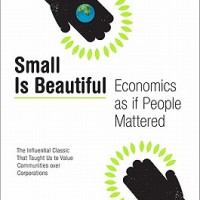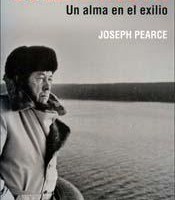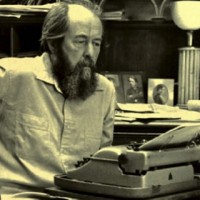Posted on Feb 13th, 2013 in
Economy,
Philosophy,
Politics |
0 comments
A little over a century ago, on August 16, 1911, the great visionary economist E. F. Schumacher was born in the German city of Bonn. An icon of the early Green movement, few people seem to know that Schumacher’s vision was inspired by the great papal encyclicals of Leo XIII and Pius XI or that Schumacher himself was a convert to Catholicism.
Disgusted with the Nazis, Schumacher moved to England before the beginning of the second world war and remained there for the remainder of his life. Best known for his international bestseller,
Small is Beautiful, published in 1973, he is, without doubt, one of the most influential thinkers of the twentieth century. The enormous impact of
Small is Beautiful, which became the bible of a new generation of environment-conscious politicians, economists and campaigners, makes it one of the most important books of its time. Jimmy Carter, following his election to the presidency in 1976, invited Schumacher to the White House for a photo-shoot. Pictures of Carter and Schumacher, arm in arm, were splashed across the newspapers, indicating, so the president would have us believe, that he was in tune with the latest thinking on “economics as if people mattered”, which was the sub-title of Schumacher’s book.
There was, however, a secret behind Schumacher’s book that his millions of admirers did not know. It was a secret that some of them would not wish to know. It was, in fact, a secret that many of them still want to keep secret. The shocking secret is that Schumacher was hugely influenced in his writing of Small is Beautiful by the teaching of the Catholic Church, a fact that appears to remain a major embarrassment to today’s E. F. Schumacher Society if its deafening silence on the subject is anything to go by.
At first skeptical that the popes ‘in their ivory tower’ could have anything of worth to teach him in the sphere of economics, Schumacher read Leo XIII’s Rerum novarum (1891) and Pius XI’s Quadragesimo anno (1931) and was astonished at the insight that the social teaching of the Church had to offer. It was, however, the promulgation of another Papal Encyclical, Paul VI’s Humanae vitae (1968), which would have the most immediate impact on his life. This Encyclical prompted his wife and one of his daughters to seek instruction in the Catholic faith. The message that Humanae vitae conveyed, wrote Schumacher’s daughter, ‘was an affirmation and support for marriage, for women … who had given themselves entirely to their marriages and who felt acutely the pressure from the world outside that shouted ever louder that homebound, monogamous relationships were oppressive to women and prevented them from “fulfilling themselves”.’ Although, at the time, Schumacher did not feel able to follow his wife and daughter into the Church, he concurred with their view of the Encyclical. ‘If the Pope had written anything else,’ he told a friend, ‘I would have lost all faith in the papacy.’
On 29 September 1971 Schumacher was finally received into the Catholic Church. Two years later his worldwide bestseller was published, a work, both popular and profound, which almost single-handedly redefined the public perception of economics and its impact upon the human person and his environment. It is, in fact, ironic that the modern environmental or ‘green’ movement derives its weltanschauung not from any ‘new age’ philosophy or neo-pagan ‘religion’ but from the expertise and wisdom of a world-renowned economist who found inspiration from the social doctrine of the Church.
After the fall of the Berlin Wall, some people predicted that global affairs had reached “the end of history” and that democratic capitalism had definitively triumphed.
Now, as the West teeters on the verge of economic crisis and suffers from the increasing statist imposition of illiberal dogmas, the prophetic voice of Alexander Solzhenitsyn — one of the 20th century’s greatest writers who saw the same errors at the heart of both the capitalist and communist systems — seems more timely than ever.
According to Solzhenitsyn biographer Joseph Pearce, the heroic Russian dissident knew that the materialism that shaped the culture of both capitalist and communist societies was ultimately inhuman because of its denial of spiritual values and because it led to serious environmental degradation.
The professor of literature and writer-in-residence at Ave Maria University has updated and reissued his biography,
Solzhenitsyn: A Soul in Exile, including new chapters written after conducting more interviews with Solzhenitsyn’s family. The latest edition also follows the Russian writer’s death in 2008.
Pearce spoke to ZENIT about what Solzhenitsyn’s monumental writings can tell us today about our own spiritual, cultural and political condition.
ZENIT: Who was Alexander Solzhenitsyn? Why should non-Russian audiences pay attention to his writing?
Pearce: Alexander Solzhenitsyn is one of the most important figures of the 20th century, both in terms of his status as a writer and in terms of the crucial role he played in the collapse of the Soviet Union and its evil communist empire.
As a writer, he was justly awarded the Nobel Prize for Literature, unlike many other unworthy recipients. His novels One Day in the Life of Ivan Denisovich, First Circle, and Cancer Ward exposed the evils of socialism and totalitarianism. Solzhenitsyn is a noble heir to the tradition of Russian fiction epitomized by the Christian humanism of Fyodor Dostoyevsky.
His epic and seminal historical work, The Gulag Archipelago, possibly his magnum opus, documented the brutality of the Soviet regime’s treatment of dissidents.
All in all, Solzhenitsyn’s corpus constituted a damning indictment of the injustice of communism and served to undermine the Soviet Union’s political and moral credibility; it contributed significantly to the rise of dissident resistance within the communist empire and to the rise of political opposition to communism in the West.
In historical terms, Solzhenitsyn deserves a place of honor beside Blessed Pope John Paul II, Ronald Reagan, Margaret Thatcher and Lech Walesa as a major player in the final defeat of Soviet communism.
As an intellectual, he is indubitably one of the greatest thinkers of the 20th century; as a cultural warrior he is an inspiration for everyone fighting for the culture of life in our nihilistic times; as a political critic, he is one of the most articulate advocates of the Christian alternative to the dead-ends of Big Government socialism and Big Business globalism, a champion of the subsidiarist principles at the heart of the Church’s social doctrine.
ZENIT: One of the major themes of your biography is that Solzhenitsyn was a prophet, first in the Soviet Union, and then in the capitalist West. How did Solzhenitsyn have the ability to diagnose the deeper problems of his time?
Pearce: Clearly, as I’ve said, non-Russian audiences should pay attention to Solzhenitsyn as a great writer, and as a great hero in the cause of political freedom.
He is, however, also a prophet. He predicted the downfall of the Soviet Union as early as the 1970s when most so-called “experts” assumed that the Soviet bloc would be part of the global political picture for many decades to come.
Even more importantly, Solzhenitsyn prophesied the unsustainability of global consumerism and the impending catastrophe that awaited a culture hell-bent on hedonism at the expense of human community and the natural environment.
The current chaos in the global economy serves as a timely warning that Solzhenitsyn’s prophecies are coming true before our eyes. Solzhenitsyn’s socio-political vision, which harmonizes with the social teaching of the Catholic Church, is full of the sort of Christian wisdom that the modern world can scarcely afford to ignore — or, at least, the sort of wisdom that it ignores at its peril.
ZENIT: You discuss in the book how Solzhenitsyn believed that both the Soviet Union and the West suffered from the same spiritual and ideological maladies that would eventually doom both societies. How is this so?
Pearce: Solzhenitsyn’s diagnosis of the spiritual and ideological maladies of the communist Soviet Union and the capitalist West rested on the insistence that both systems shared the same fundamental materialism.
At root, the Soviet Union and the capitalist West were united by a secular fundamentalism rooted in an essential philosophical materialism that excludes God and religion from political and economic life. The ideologies of Mammon and Marx are equally godless and are equally inimical to religion in general and to Christianity in particular. Such systems are not merely wrong, they are ultimately evil.
Solzhenitsyn’s devastating critique of the hedonism and decadence of the modern West, particularly in his controversial Harvard address in 1978, heralded the fact that he was a prophet not merely of the evils of communism, but also of the evils of atheistic materialism in all its guises.
Posted on Jan 28th, 2013 in
France,
History |
0 comments
If a thing is worth doing at all, it’s worth doing badly…
This paradoxical witticism of Chesterton was on my mind as I sat down to watch The War of the Vendée, a recent film about the forgotten martyrs of the French Revolution. I was pleased that a film had been made to honour the heroes of the Vendée but I feared that it would be a really bad film. Certainly everything seemed to suggest that it would be awful. It was made with a miniscule budget and a cast of dozens as opposed to thousands. How could a couple of dozen actors realistically depict a battle scene or the slaughter of thousands of Catholics by Robespierre’s terrorists? Worse still, the film’s director, Jim Morlino, had decided to use only child actors. Wasn’t this a recipe for disaster? Oh well, I thought as I hit the play button, if a thing is worth doing at all, it’s worth doing badly…
Fearing the worst, I found myself charmed by the film, and was moved to tears of sorrow for the fate of the martyrs of the Catholic Resistance but also to tears of laughter at the moments of comic relief.
As I watched the child actors playing husbands and wives, and even grandparents, I realized that you had to see the film through the eyes of a child in order to see it at all. This is emphatically not to suggest that the film is childish but that we adults have to become childlike in order to enter the kingdom of truth that the film presents to us. We have to suspend our disbelief, walking through the wardrobes of our imagination into a world where the eternal verities shine forth with innocence and wonder.
As I allowed my own imagination to wander through the wardrobe of wonder, I found myself, to my surprise, not in Narnia but in Middle-earth. The romantic and rustic depiction of life in the villages of the Vendée became, for me, a reincarnation of the Shire. Once this connection had been made, the child actors became hobbits, halflings who faced the French revolutionary dragons with an unsophisticated innocence. I am sure that something of this vision was in the mind of Morlino, who depicts the evil Robespierre as being demonically possessed, as no doubt he was. Robespierre is as unsophisticatedly evil as the peasants of the Vendée are unsophisticatedly good.
There is a price to pay for this unabashedly pure approach to the problem of evil, such as a loss of the nuanced niceties that historical accuracy demands (and should demand), but the price is well worth paying. Deep down, at the bedrock level of truth, the French Revolution was as evil as anything that the Fellowship of the Ring had to face. Its bloodthirsty secular fundamentalism set the scene for the bloodletting of the next two centuries. In its insatiable war on the Faith, secularism began with the guillotines and the Great Terror and metamorphosed into the Gulag and the gas chamber. Today, of course, it attacks the Faith and the Family and is systematically exterminating the weak and disabled members of society through the plague of abortion.
Make no mistake, Robespierre was one of Satan’s greatest servants and the villagers of the Vendée were certainly on the side of the angels. As such, we can be sure that both sides in this epic struggle between good and evil now have their reward. Robespierre would be killed by the same orcs that he had unleashed on the Vendée and his fate after death might be too horrible to contemplate. The heroic villagers of the Vendée, butchered in their thousands by the hordes of revolutionary orcs, are now in the company of the saints, martyrs and angels.
In these dark days in which the power of secular fundamentalism appears to be on the rise and in which religious freedom seems to be imperiled, it is easy for Christians to become despondent. The clouds of radical relativism seem to obscure the light of objective truth and it can be difficult to discern any silver lining to help us illumine the future with hope.
In such gloomy times the example of the martyrs can be encouraging. Those who laid down their lives for Christ and His Church in worse times than ours are beacons of light, dispelling the darkness with their baptism of blood. “Upon such sacrifices,” King Lear tells his soon to be martyred daughter Cordelia, “The gods themselves throw incense.”
It is said that the blood of the martyrs is the seed of the Church and, if this is so, more bloody seed has been sown in the past century than in any of the bloody centuries that preceded it. Tens of millions have been slaughtered on the blood-soaked altars of national and international socialism in Europe, China, Cambodia and elsewhere. Today, in many parts of the world, millions upon millions are being slaughtered in the womb in the name of “reproductive rights.”
In such a meretricious age the giant figure of Alexander Solzhenitsyn emerges as a colossus of courage. Born in Russia in 1918, only months after the secular fundamentalists had swept to power in the Bolshevik Revolution, Solzhenitsyn was brainwashed by a state education system which taught him that socialism was just and that religion was the enemy of the people. Like most of his school friends, he enslaved himself to the zeitgeist, became an atheist and joined the communist party.
Serving in the Soviet army on the Eastern Front during the Second World War he witnessed cold blooded murder and the raping of women and children as the Red Army took its “revenge” on the Germans. Disillusioned, he committed the indiscretion of criticizing the Soviet leader Josef Stalin and was imprisoned for eight years as a political dissident.
While in prison, he resolved to expose the horrors of the Soviet system. Shortly after his release, during a period of compulsory exile in Kazakhstan, he was diagnosed with a malignant cancer in its advanced stages and was not expected to live. In the face of what appeared to be impending death, he converted to Christianity and was astonished by what he considered to be a miraculous recovery.
Throughout the 1960s Solzhenitsyn published three novels exposing the secularist tyranny of the Soviet Union and received the Nobel Prize for Literature in 1970. Following the publication in 1973 of his seminal work, The Gulag Archipelago, an exposé of the treatment of political dissidents in the Soviet prison system, he was arrested and expelled from the Soviet Union, thereafter living the life of an exile in Switzerland and the United States. He finally returned to Russia in 1994, after the collapse of the Soviet system.
In 1978, Solzhenitsyn caused great controversy when he criticized the secularism and hedonism of the West in his famous commencement address at Harvard University. Condemning the nations of the so-called free West for being morally bankrupt, he urged that it was time “to defend not so much human rights as human obligations.”
Read the complete article in Crisis Magazine



